 Leading Blog | Posts by Month |
 Leading Blog | Posts by Month |
08.31.22

LeadershipNow 140: August 2022 Compilation
See more on
Posted by Michael McKinney at 07:10 AM
08.29.22

Leadership Lessons from Coach Nick Saban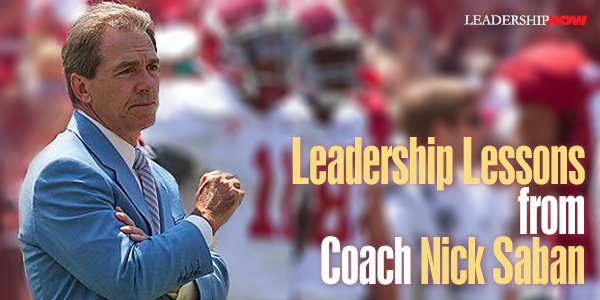
ON August 25, Chris Low posted an ESPN interview with 70-year-old Nick Saban, who just signed a new $93.6 million contract extension that runs through the 2030 season. Here are a few of the highlights that provide us with some leadership lessons: Think like a freshman. “You have to be flexible. I think that’s one of the most important things about competitive sports … If you don’t sort of study the game and know the impact of these things and use them to your advantage, you’re going to just completely get bypassed by a lot of folks.” Success is a choice. Take responsibility for your choices. “I heard it said that none of us are born winners, and none of us are born losers. We’re all born choosers. So choosing the right things that are going to help you be successful ... that doesn’t really change.” Focus on what you can become. “The one thing, because of the brand that we have here, that players can see, is they can earn a tremendous amount of money because of the brand and because of the image that they can create using that brand to promote themselves, which has happened. The players that we’re recruiting are not coming here because of the money we’re giving them to come here. They’re coming here because of what they can earn being here because of the history that we have of guys creating value for themselves.” Hold yourself to a high standard. “I wouldn’t want to coach someplace that didn’t have a high standard.” Good leadership means continual growth. “I think I’ve become a better teacher. I think yelling and screaming at players in this day and age really goes in one ear and out the other. If you want them to really resonate on what you’re saying, you just need to teach it, and sometimes, it works better if you do it individually than if you do it in front of other people. That’s not something I considered in years past, several years past.” Build a good team. “We don’t have a lot of what I call energy vampires, guys that take all your time because they’re not doing what they’re supposed to do. We have a team that has bought in, and they’re all trying to do the right thing.”
Posted by Michael McKinney at 09:31 AM
08.26.22

Episode #004: Jeff Lerner – How to Unlock Your Potential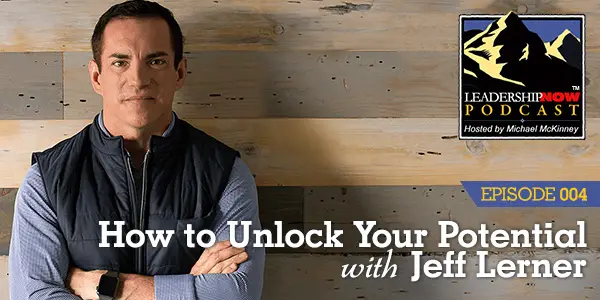
AFTER A DECADE of building multiple online businesses to over 8 figures and twice landing on the Inc. 5000, Jeff Lerner turned his focus to educating and inspiring entrepreneurs about the power of digital business. In 2019 he founded the ENTRE Institute to create a new generation of ENTREpreneurs. He has taken his story and the lessons he has learned and compiled them into a solid bestseller titled, Unlock Your Potential: The Ultimate Guide for Creating Your Dream Life in the Modern World. It resonates with many of the frustrations people are faced with in our time. In this podcast I talk to Jeff about how we can unlock our potential and take advantage of the opportunities available now in the new economy. You can find more details and resource links on the episode home page. “This is what the 3Ps is: it is a simple, heuristic filter. It is a lens that you can look at your life through to say, at any given time, if I am not moving my life forward physically, personally, or professionally, then I am somewhere between wasting time and killing myself slowly. And that’s it!”
Posted by Michael McKinney at 06:41 AM
08.25.22

Leading Thoughts for August 25, 2022
IDEAS shared have the power to expand perspectives, change thinking, and move lives. Here are two ideas for the curious mind to engage with: Fred Harmon on the value of self-restraint: “Situational rather than habitual self-restraint is always a strain. Self-mastery lets us relax and focus on results even in tense situations. The world-famous tennis star does not lose her concentration because she is behind in the deciding set. Long practice in controlling her emotions permits her to continue playing at her peak. The practice of self-restraint in making common everyday acts more perfect builds up a similar inner calm on which one can rely in any crisis.” Source: The Executive Odyssey: Secrets for A Career Without Limits
Andrew and Nada Kakabadse and Linda Lee-Davies on staying forever refreshed as a leader:: “Successful leadership is never truly mastered as it is an organic service which must be ever refreshed and refined. The changing nature and demands of the follower and the changing nature and demands of the external environment mean that even once the leader has reached a point of maximum provision for their troops in their current state, they must put some serious planning into the next likely situation they will face. There is no rest, learning to lead never stops and the truly successful, the truly great leader knows that they are leading to learn.” Source: Leading for Success: The Seven Sides to Great Leaders Look for these ideas every Thursday on the Leading Blog. Find more ideas on the LeadingThoughts index.
Posted by Michael McKinney at 06:48 AM
08.22.22

Are You a Learner or a Judger?
IN SITUATION after situation, we are faced with the choice of adopting a Learner mindset or a Judger mindset. The Judger mindset comes quite naturally to us. We all do it. And we have Learner moments as well. The Learner mindset opens us up to possibilities while the Judger mindset leaves us, at the very least, in an unproductive state. The Learner mindset is a choice. The Judger mindset is a reaction to our circumstances. The trick is to be mindful of the path we are on and make the appropriate adjustment. We make that adjustment by changing the questions we are asking. That is the premise behind Marilee Adams’ book, Change Your Questions, Change Your Life. Marilee offers a helpful Choice Map to help us to zoom out and look at where we are at any given time and make the most productive choice. As a leader and coach, it is important to understand that “you can’t help anyone from a Judger place.”
It is worth rereading that last paragraph. We struggle to grow because, as she writes, “Much of what we experience can just seem true or real or logical to us. We go along as if what we experience is the way things are.” To lead is to be aware of that fact. When there is conflict, the Judger element is there. “Whenever two people find themselves in conflict, whoever wakes up to their own Judger has the ability to turn the situation around.” Judgers and Learners ask different questions. If you are on a Judger path, you need to change your questions to switch to the Learner path. Judger questions constricting questions and sound like this: What’s wrong with me?
On the other hand, Learner questions are expansive, energizing questions that sound like this: What happened?
With the Judger agenda, the costs can be tremendous. The future can only be a recycled version of the past. If you’re working from the Learner program the power is on. The juices is flowing. You can make a new future for yourself. Marilee makes an important distinction between having good judgment and being judgmental. Good judgement is essential, but judgmentalism is destructive. “Exercising judgment is about thinking things through and making informed choices.” But being judgmental is about “fault-finding or being critical or dwelling on the negative.” She adds that the “Judger mindset is the enemy of good judgment.” When you think Judger, think judgmental. If we can accept the fact that we gravitate to Judger and choose Learner, we can make progress by changing the questions—asking switcher questions like: Am I in Judger mode? Is this what I want? Ho else can I think about this? Marilee has also developed a workbook to help work through triggering situations and adapt and develop a learner mindset. It’s a helpful companion to the book. In the workbook, she outlines the Judger and Learner attributes. The chart below is very useful in understanding the change your questions, change your life program.
Judgmentalism limits our leadership. Our influence is diminished as it puts distance between ourselves and others. 
Posted by Michael McKinney at 06:40 AM
08.19.22

Podcast Episode #003: Chris Westfall – How to Make Life Easier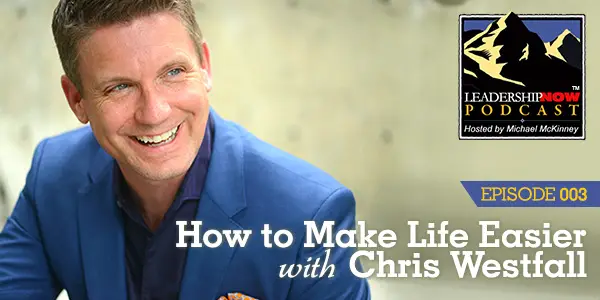
CHRIS WESTFALL has helped launch over five dozen businesses, helping to raise over $100 Million in investment capital. His clients have appeared on Shark Tank, Dragons’ Den in Canada, and Shark Tank Australia. Chris is the Champion of the US National Elevator Pitch, a competition challenging students to make a convincing and engaging “Elevator Pitch” to an Angel Investor. He is recognized as a Top 10 Business Coach and regularly works with Fortune 500 Companies and high-impact leaders.
You can find more details and resource links on the episode home page. “Life isn’t easy. In fact, it can be very difficult. Our careers can be difficult. Our relationships can be difficult. And all those things blend together, and that makes life difficult. But in any circumstance, and in any situation, there is always a way to show up that makes things easier. Not easy, but easier.”
Posted by Michael McKinney at 07:12 AM
08.18.22

Leading Thoughts for August 18, 2022
IDEAS shared have the power to expand perspectives, change thinking, and move lives. Here are two ideas for the curious mind to engage with: Former Blue Shield of California CEO Bruce Bodaken and Robert Fritz on opinion dumps: “Telling someone your opinion is not the same as exploring reality. Groups that really tell each other the truth are the ones that ask each other questions, seriously seek to understand opinions that are different from their own. They strive to comprehend rather than simply impose their ideas on others, and they engage in a collective dialogue in which people together seek understanding.” Source: The Managerial Moment of Truth: The Essential Step in Helping People Improve Performance
Ram Charan on the roadblocks to moving forward: “Today transformational change is the norm. Every company has to be able to perceive what will make their best-laid plans obsolete tomorrow and change direction quickly. Dissatisfaction with the status quo and a search for what’s next is a universal human endeavor. It does not reside in one person, department, or organizational layer. The flow of ideas cannot be blocked by bureaucratic layers. Do the people at traditional companies welcome change? What happens to the good ideas that emerge? How quickly do they get converted into action?” Source: Rethinking Competitive Advantage: New Rules for the Digital Age Look for these ideas every Thursday on the Leading Blog. Find more ideas on the LeadingThoughts index.
Posted by Michael McKinney at 07:20 AM
08.15.22

3 Things You Need to Do to Unlock Your Potential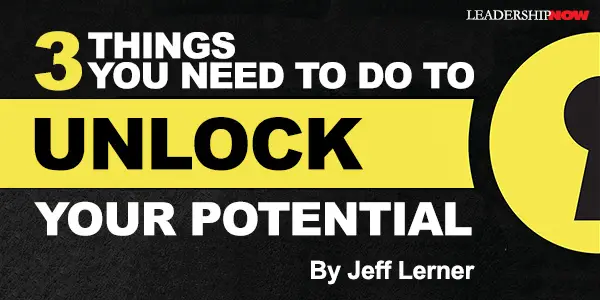
AT 16, I began my summer job working in the office supply room at a prominent local law firm. After three weeks of being treated poorly, I expressed my frustrations to my boss. I was fired by the end of the day. That job was my first and last taste of the corporate world. So, I did some soul searching. The experience confirmed what I already knew deep down, that I was not cut out to work a traditional job, so I decided to pursue music instead. I figured if I was going to have to trade my time for money, it should at least be for doing something I enjoyed. Seeing high school at that point as just an early form of job training, I convinced my parents to let me drop out and pursue a career in music. They allowed it and even bought me a piano to practice on, but they were also quite clear that I was making my bed and would have to spend the rest of my life sleeping in it. I agreed and got to practicing — 10, 12, and 14 hours a day. I was obsessed — anything to avoid ever having to get another job. By my early 20s, I was earning a full-time living performing and landed some gigs playing for “the society circuit” — the upper crust of Houston society which consisted mostly of energy executives and successful entrepreneurs. I was fascinated by these wealthy people who had the creative freedom of a musician but none of the financial struggle. Once I connected the dots that most of them owned their own businesses, I became obsessed with doing the same for myself. During my 20s, I failed at 11 businesses, but I didn’t give up. At 29, after my final failure — 2 franchise restaurants which left me almost half a million dollars in debt — I discovered the concept of making money online. I was at the proverbial rock bottom, overweight, getting a divorce, and hiding from creditors, so I figured, what did I have to lose? I maxed out my last working credit card buying a course on affiliate marketing. And it worked, or rather I did … like a maniac. In 5 years, I generated over $10 million in commission with affiliate marketing, then launched a digital marketing agency that did roughly $30 million in sales and landed on the INC 5000 list twice. Eventually, I was presented with the opportunity to sell my agency, and I took it, but I knew I wanted to pursue something else. I wanted to help others achieve the same level of success that I had created. In 2019, I started ENTRE, an online education company on a mission to disrupt the education system and usher a new generation of “ENTREpreneurs” into the world. The rest is history. How Anyone Can Unlock Their Potential I want to make it clear that I truly believe everyone is an entrepreneur and can create any life they want in the modern economy, even if you don’t have a lot of money. To put this into perspective, here is a list of my companies and their total startup budgets: Affiliate Marketing: $14K (grossed $10M in 4 years)
As you can see, you don’t need millions of dollars to start a business. Now, I’m going to list three things you need to do to unlock your potential and create the life you want in the modern world: 1. Avoid Lifestyle Creep Avoid lifestyle creep by holding onto the extra money you receive as your income increases. The next step is to invest in things that either create passive income or reduce expenses moving forward (e.g., buying a duplex and “house hacking” or paying for a car with cash to eliminate loan payments). Just because you have more money doesn’t mean you should spend more. If you do, you’ll be stuck living paycheck to paycheck.2. Take Action Most people think about taking action but are scared to fail. So, they stay where it’s safe and never change or grow. However, your comfort zone prevents you from building the life you want. Anything great comes with the risk of failure.There is no chance for success in entrepreneurship without taking a risk. No one starts off creating million-dollar businesses. They start off creating and failing at several businesses until they find the one that sticks. Even then, that one successful business may not be their million-dollar business, but action was taken, and momentum was gained. 3. Shift Your Perspective I believe risk tolerance is the new security, or at least an essential part of it. The old 40/40 plan (find a job to work 40 hours a week for 40 years and retire) has gone the way of the dodo bird. Every day the Bureau of Labor Statistics or some research firm publishes statistics that validate what we can all feel and see around us: the top jobs of the next ten years don’t even exist today, colleges are woefully behind in teaching the skills that matter most, most employees last an average of less than two years at any given job, and the average person has less than 10% of what they need for retirement, and so on. The institutions that we have put our faith in for the last century (college degrees, long-term job security, retirement plans, etc.) are somewhere between underwhelming and insolvent. And yet, our nervous systems, which evolved over hundreds of thousands of years during which things changed relatively slowly, still prompt us to look around for large, collective institutions we can rely on. But they aren’t there. On the contrary, we need to be relying on ourselves and taking calculated risks. I believe that 10,000 years from now, biologists will look upon this century as the time when the nature of man’s relationship to risk shifted, entrepreneurial creativity and value innovation became the new best strategy, and intelligent risk appraisal became the new evolutionary advantage. Of course, time will tell, but in the meantime, the happiest people I know are already entrepreneurs who take control of their lives and create the life they want using business as a tool rather than a trap, so I’ll continue to take my chances.  
Posted by Michael McKinney at 09:52 AM
08.11.22

Leading Thoughts for August 11, 2022
IDEAS shared have the power to expand perspectives, change thinking, and move lives. Here are two ideas for the curious mind to engage with: Historian John Lukacs on turning points: “A turning point is not a milestone; the latter is a numerically fixable place, foreseeable, linear, and sequential. A turning point may occur in a person’s mind; it may mean a change of direction; it has consequences that are multiple and unpredictable, consequences that are more multiple and unpredictable, consequences that are more often than not recognizable only in retrospect. A turning point may sometimes be foreseeable, but not with certainty.” Source: Five Days in London: May 1940
Professor Emeritus at Fuller Theological Seminary Eddie Gibbs on what we find in the absence of good leadership: “Feedback is no longer oriented to how people can succeed but to how they have failed—not just in their work but as human beings.” Source: Leadership Next: Changing Leaders in a Changing Culture Look for these ideas every Thursday on the Leading Blog. Find more ideas on the LeadingThoughts index.
Posted by Michael McKinney at 08:40 AM
08.09.22

Why Government Managers Often Miss the Astonishing Power in Front-Line Ideas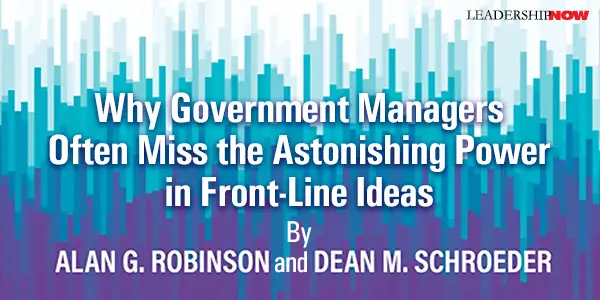
THE Practical Innovation in Government study is one of the largest studies in the last three decades on how to improve government efficiency. Over a six-year period, we analyzed 77 government organizations—ranging from small departments to entire cities and states—in five countries and interviewed more than 1,000 people. Our revelatory finding? The highest performers in the study were operating at levels of efficiency and service that rivaled the best private-sector companies anywhere. One thing stood out about them: their transformations took place on the front lines, where highly engaged employees were regularly innovating, solving problems, and championing improvements. We came to call this front-line–driven improvement, and it turned out to be a highly effective way to improve performance in a government setting. This is particularly important as, according to extensive research, 80% of any organization’s improvement potential lies in the ideas and creativity of its people on the front lines. If front-line ideas have so much potential to improve government operations, why do so many managers largely ignore them? Here, we offer some insights into this paradox. A Case Study: Denver’s Department of Excise and Licensing Let’s begin by looking at some ideas from one of the front-line driven units in our study: Denver’s Department of Excise and Licensing, which is responsible for issuing some 80 different types of licenses, from individual licenses for taxi drivers and merchant security guards to business licenses for restaurants and liquor stores. Denver Licensing used to be the city’s “problem” department because of excruciatingly long delays: average wait times were one hour and 40 minutes, with maximum wait times of eight hours. But under a new manager in just 18 months, Denver Licensing was transformed into the city’s showcase department. Through hundreds of small, front-line ideas, wait times were all but eliminated. To make our point, let’s look at two of these front-line ideas. The first idea had to do with the computer and printer that had been set up in the lobby so that applicants who needed to submit criminal background checks as part of their license application could conduct and print these checks themselves. The problem was that the specialized software used to run the checks was cumbersome and confusing. Customers were constantly getting stuck and having to ask a licensing technician for help. On average, this happened 36 times per day, with each incident taking about five minutes of a technician’s time. Denver Licensing’s staff came up with a solution: they created a simple instruction manual with screenshots and arrows to walk applicants through the process step by step. The idea saved, on average, three hours of technician time every day. A second idea also saved technicians’ time and eliminated minor errors. When applicants arrived at the service counters and handed over their completed applications, which could include seven or more forms, the technicians had to enter this information into a computer. The problem was that the computer’s input screens were set up differently than the forms, which meant the technicians had to constantly flip pages back and forth to locate the next piece of information. Not only was this irritating and time-consuming, but it also led to a slew of input errors. The solution? A front-line technician suggested that the application forms be redesigned to line up with the computer screens. Think about these two simple improvements. They were spotted by the people doing the work, not by their bosses. How would managers, especially those above the level of direct supervisors, even know about the underlying problems? Yet, to the technicians who had to deal with them every day, these issues were annoyances and time wasters. More importantly, they could be dealt with by the employees themselves if given the necessary authority, time, and resources. Small Improvements Add Up Quickly Although the solutions were simple and involved relatively minor changes, considering the many times each day these problems occurred, the cumulative impact of eliminating them was huge. The simple instruction manual idea, for example, saved five minutes of a technician’s time for each avoided interruption. Multiply this by 36 times per day, five days per week, and 52 weeks a year, and you have more than 750 hours of technician time per year. And remember: this idea was only one of hundreds of such improvements identified and implemented by Denver Licensing’s front-line staff. Front-Line Solutions Are Often Invisible All of this brings us to the primary question: “When government managers think about improving their departments or organizations, why don’t they think of front-line ideas as a go-to source for improvement?” It all comes down to the “invisible” nature of most front-line ideas. Both the problems and their solutions are small enough to be effectively invisible to anyone not directly involved in doing the work. The good part of being invisible is that these kinds of ideas and changes encounter very little resistance. The bad part of being invisible is that no one in management sees them or appreciates their impact. Such improvements simply disappear into the way the daily work gets done, with management none the wiser. All that higher-level managers see is a well-run department. So here you have this strange situation: government managers most need what they can’t see. What’s the remedy? Provide managers with education that raises their awareness of the fact that 80% of an organization’s improvement capability lies in the creativity and ideas of their front-line staff. Teach managers how to lead in ways that promote and support front-line–driven improvement. And then design and implement mechanisms so higher managers are regularly exposed to front-line staff and their small-but-mighty ideas.  
Posted by Michael McKinney at 03:01 PM
08.05.22

Podcast Episode #002: Ruben Gonzales – The Courage to Succeed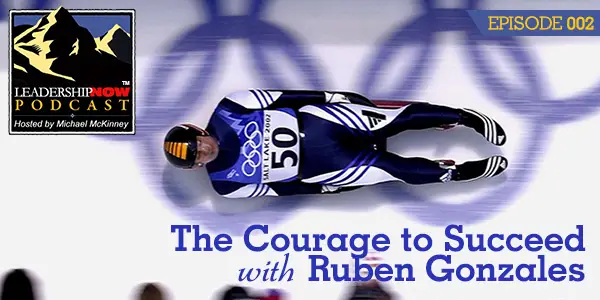
HE wasn’t a gifted athlete. He didn’t take up the sport of luge until he was 21. Against all odds, four years later he was competing in the Winter Olympics. At the age of 47 he was competing against 20-year-olds in the Vancouver Olympics. At 55, after a seven year break, he became the oldest person to compete internationally in the sport of luge. He’s proof that ordinary people can achieve extraordinary things if they will follow a few simple steps. You can find more details and resource links on the episode home page. For Ruben Gonzalez his childhood dream was to go to the Olympics, and at the tender age of 21, Ruben took up the luge and started training for the Olympics. Four years later, he was racing for the Gold against the best in the world. At 47, he was racing against 20-year-olds in the Vancouver Olympics, becoming the first person to ever compete in four Winter Olympics, each in a different decade. He is the author of The Shortcut—a business fable about finding a guide to get you where you want to go. He is also the author of The Courage to Succeed, which explains how consistently and persistently following a set of success principles will help you realize your potential.
Posted by Michael McKinney at 06:30 AM
08.04.22

Leading Thoughts for August 4, 2022
IDEAS shared have the power to expand perspectives, change thinking, and move lives. Here are two ideas for the curious mind to engage with: Performance coach Jason Selk on the need to heat up your performance: “All day long, the thermostat governs the temperature in the room and won’t allow the room temperature to rise or drop from the desired temperature for long. Human beings are the same way: we neither outperform nor underperform our self-image for very long. That’s why it is so important to set your self-image gauge high enough to achieve your life goals. Set your self-image gauge too low, and by definition, you’ll underachieve because your mind won’t call for the motivation to achieve more.” Source: Executive Toughness: The Mental-Training Program to Increase Your Leadership Performance
Jim Loehr explaining that the key to mental recovery is to give the conscious, thinking mind intermittent rest explaining that the key to mental recovery is to give the conscious, thinking mind intermittent rest: “Much like the body, the brain needs time to recover from exertion. After we have learned new information or had new experiences, it takes time for the brain to consolidate and encode what it has learned. In the absence of downtime, or recovery, that learning cannot take place as efficiently.” Look for these ideas every Thursday on the Leading Blog. Find more ideas on the LeadingThoughts index.
Posted by Michael McKinney at 07:36 AM
08.01.22

First Look: Leadership Books for August 2022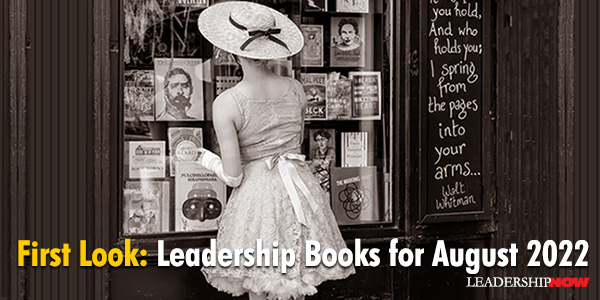
HERE'S A LOOK at some of the best leadership books to be released in August 2022. Be sure to check out the other great titles being offered this month.
Is there an alternative to the "system of systems" we live in: school, college (debt), job, different job, more different jobs, 401K/pension, retire (hopefully but probably not)? And if there is an alternative can it really work for everyone regardless of where they currently are in the system? Is there something else out there that works equally well for the 18-year-old deciding whether or not to go to college, the 45-year-old questioning his/her career path, the 65-year-old who is way short of being able to retire, and anyone else feeling dazed and confused in the modern world? In Unlock Your Potential, author and entrepreneur Jeff Lerner answers those questions with a resounding YES! He shows readers how the failings of our education, employment, and retirement systems have opened doors most people didn't even know exist. And, most important, he'll show YOU how to step through those doors—where they exist, how they work, what it takes to go through them, and what's on the other side.
Algorithms and apps analyze data and tell you how to beat the traffic, what books to buy, what music to listen to, and even who to date—often with great results. But what do you do when you face the big decisions of life—the "wild problems" of who to marry, whether to have children, where to move, how to forge a life well-lived—that can’t be solved by measurement or calculation? In Wild Problems, beloved host of EconTalk Russ Roberts offers puzzled rationalists a way to address these wild problems. He suggests spending less time and energy on the path that promises the most happiness, and more time on figuring out who you actually want to be. He draws on the experience of great artists, writers, and scientists of the past who found creative ways to navigate life’s biggest questions. And he lays out strategies for reducing the fear and the loss of control that inevitably come when a wild problem requires a leap in the dark.
Life is full of paradoxes. How can we each express our individuality while also being a team player? How do we balance work and life? How can we improve diversity while promoting opportunities for all? How can we manage the core business while innovating for the future? For many of us, these competing and interwoven demands are a source of conflict. Since our brains love to make either-or choices, we choose one option over the other. We deal with the uncertainty by asserting certainty. There's a better way. In Both/And Thinking, Wendy Smith and Marianne Lewis help readers cope with multiple, knotted tensions at the same time. Drawing from more than twenty years of pioneering research, they provide tools and lessons for transforming these tensions into opportunities for innovation and personal growth.
Professional women are subject to blind spots—obstacles that can minimize career potential, impact, or advancement. Some women end up drifting instead of driving through their careers, going it alone instead of building a posse, and leaving their “reputationality” (that special something we are known for) to chance. Authors and executive coaches Brenda Wensil and Kathryn Heath have spent decades coaching more than 800 women and working with women executives, middle managers, and professionals across industries and age groups. In this book, they outline six challenges women commonly face on their professional journeys and map a way to accelerate through them for higher-impact careers.
In True North: Emerging Leader Edition, renowned leadership expert Bill George and Millennial tech entrepreneur Zach Clayton issue the challenge to emerging leaders—from Gen X to Millennials and Gen Z—to lead their organizations authentically through never-ending crises to make this world a better place for everyone. The authors offer practical strategies and techniques to become an authentic leader and reveal how you can navigate your own path to success. They draw on extensive information from a diverse collection of inspirational real-life leaders and combine it with invaluable advice on everything from personal values to crisis leadership and self-awareness. The Emerging Leader Edition is filled with dramatic stories of how successful leaders such as Microsoft’s Satya Nadella and Merck’s Ken Frazier to PepsiCo’s Indra Nooyi and General Motors’ Mary Barra, and emerging leaders like OneTrust’s Kabir Barday and Rent the Runway’s Jenn Hyman, overcame great challenges to build highly successful organizations.
Unleash the power of storytelling to transform your talks, speeches, and presentations—whether your audience is a boardroom of executives, a classroom of students, or an auditorium full of eager listeners. Everyone, regardless of their background and training, can improve their storytelling abilities. But what is a story? How can you tell it in a way that delights and informs your listeners? Take a journey into the keys to great storytelling with two of the country’s top experts on story presentation and speech writing. In The Art of the Tale, expert storytellers Steven James and Tom Morrisey team up and tap into their lifetimes of experience to show you how to prepare stellar presentations, tell stories in your own unique way, adapt your material to different groups of listeners, and gain confidence in your ability as a speaker.
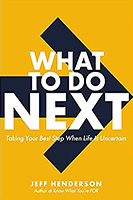 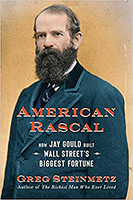  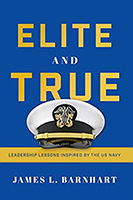
“To add a library to a house is to give that house a soul.” — Cicero
Posted by Michael McKinney at 07:07 AM
|
BUILD YOUR KNOWLEDGE


How to Do Your Start-Up Right STRAIGHT TALK FOR START-UPS 
Grow Your Leadership Skills NEW AND UPCOMING LEADERSHIP BOOKS 
Leadership Minute BITE-SIZE CONCEPTS YOU CAN CHEW ON 
Classic Leadership Books BOOKS TO READ BEFORE YOU LEAD |
|